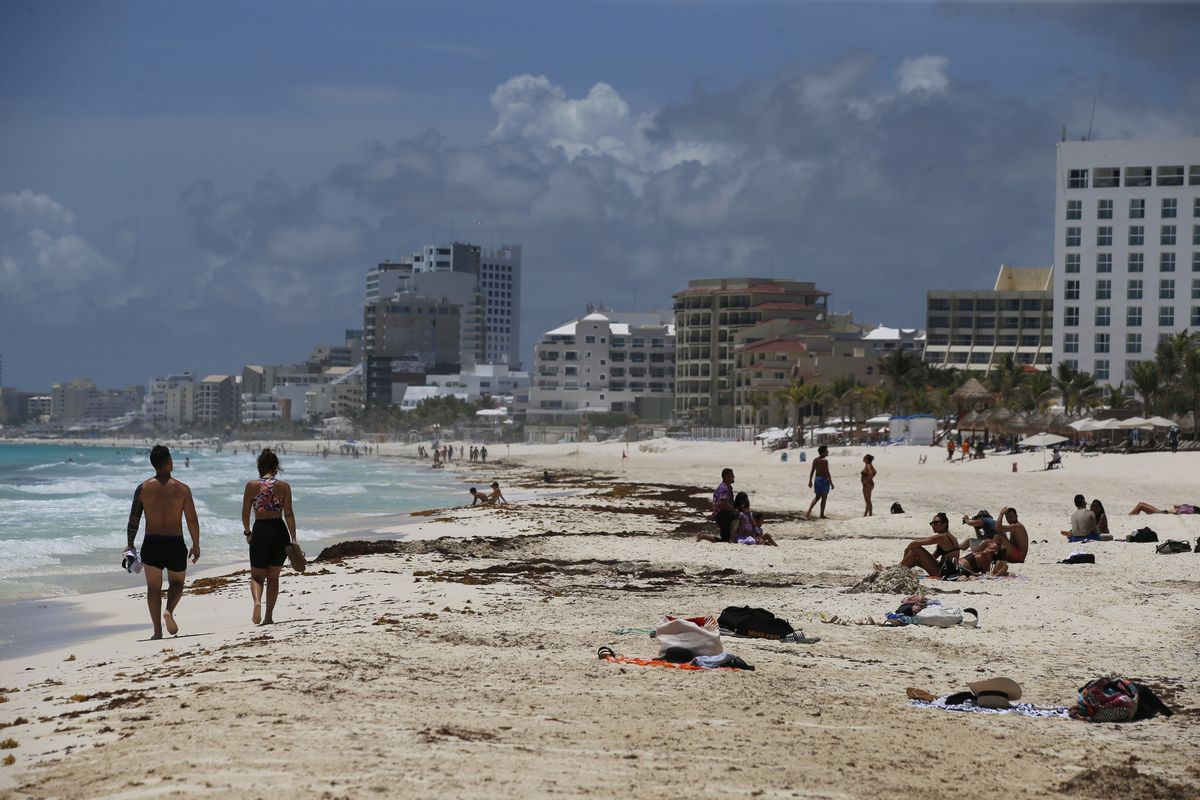Hurricane Grace makes landfall near Mexico’s Tulum temples

PLAYA DEL CARMEN, Mexico — Hurricane Grace struck Mexico’s Caribbean coast just south of the ancient Mayan temples of Tulum early Thursday, pushing a dangerous storm surge. Heavy rain and strong winds threatened to destroy flimsier homes and keep tourists off white sand beaches until it crosses the Yucatan Peninsula.
The Category 1 storm had already soaked earthquake-damaged Haiti, Jamaica and the Cayman Islands en route to a direct hit on the Riviera Maya, the heart of Mexico’s tourism industry. Grace’s center struck just south of Tulum at 4:45 a.m. CDT with maximum sustained winds of 80 mph, according to the U.S. National Hurricane Center.
As it moved over land, Grace weakened to a tropical storm Thursday morning with 65 mph sustained winds. It was moving west across the peninsula at 18 mph and was located about 85 miles west of Tulum.
The storm was forecast to re-emerge over the Gulf of Mexico Thursday night into Friday.
On Thursday morning, the streets of Playa del Carmen north of where Grace made landfall were littered with tree branches. Some power lines hung limply and strong gusts of wind blew a stinging rain.
Quintana Roo Gov. Carlos Joaquín said the storm had knocked out power to some 84,000 customers in Cancun and 65,000 in Playa del Carmen, Cozumel, Puerto Aventura and Tulum.
One lane of the highway between Playa del Carmen and Tulum was blocked by a fallen road sign. A gas station was destroyed when a large pavilion blew down, smashing two cars.
The state had opened shelters and evacuated some hotels and residents ahead of the storm’s arrival. Grace missed the popular cruise ship destination Cozumel and came ashore south of Playa del Carmen, where the downtown, usually thumping with music and clubgoers, was eerily desolate Wednesday night. Authorities had ordered all businesses closed and people inside by 8 p.m.
One exception was Axel Felix, a 37-year-old pizza deliveryman making his last drop-off of the night in a rain slicker. “Now I’m going home and I’m not going out until tomorrow,” Felix said. “You’ve got to be careful and stay at home.”
Another was Juan González, a 25-year-old student walking his dog. “At home we will be calm with food, waiting to see what happens and with the windows protected,” he said.
With little to stand in its way on the peninsula, Grace was expected to weaken slightly then regain hurricane strength in the Gulf of Mexico before making a second landfall in Mexico later this week.
On Tulum’s main drag, tourists in plastic ponchos splashed through puddles as the wind picked up. On the beach side, the surf grew and beachgoers took shelter from the blowing sand. Armed soldiers and sailors patrolled Tulum’s streets in trucks, and businesses taped and boarded up windows as lines formed at grocery stores with families stocking up on essentials.
“We’re taking precautions, buying milk, sugar, water and cookies because we don’t know how long we’ll be shut in,” said 21-year-old homemaker Adamaris García, standing in a line of dozens of people at a small store.
Meanwhile, some tourists fretted over a lost day at the beach while others prepared for their first hurricane experience.
Johanna Geys, of Munich, Germany, was having a beer in Tulum Wednesday afternoon. It was her first time in Mexico and Grace would be her first hurricane.
“We don’t know how it is (in hurricanes), ” said Geys, a 28-year-old waitress. People have been telling her it won’t be bad.
Leaving a store with some supplies, 25-year-old California law student Sarah Lynch said she wasn’t too worried.
“We have extra water. We prepared for the hurricane and we’re just going to roll with the storm and see what happens,” Lynch said. “It’s a little scary because it’s unknown, but besides that we’re okay. We made it through COVID.”
State authorities said that as of last week, the region was hosting about 130,000 tourists and hotels were more than half full despite the pandemic.